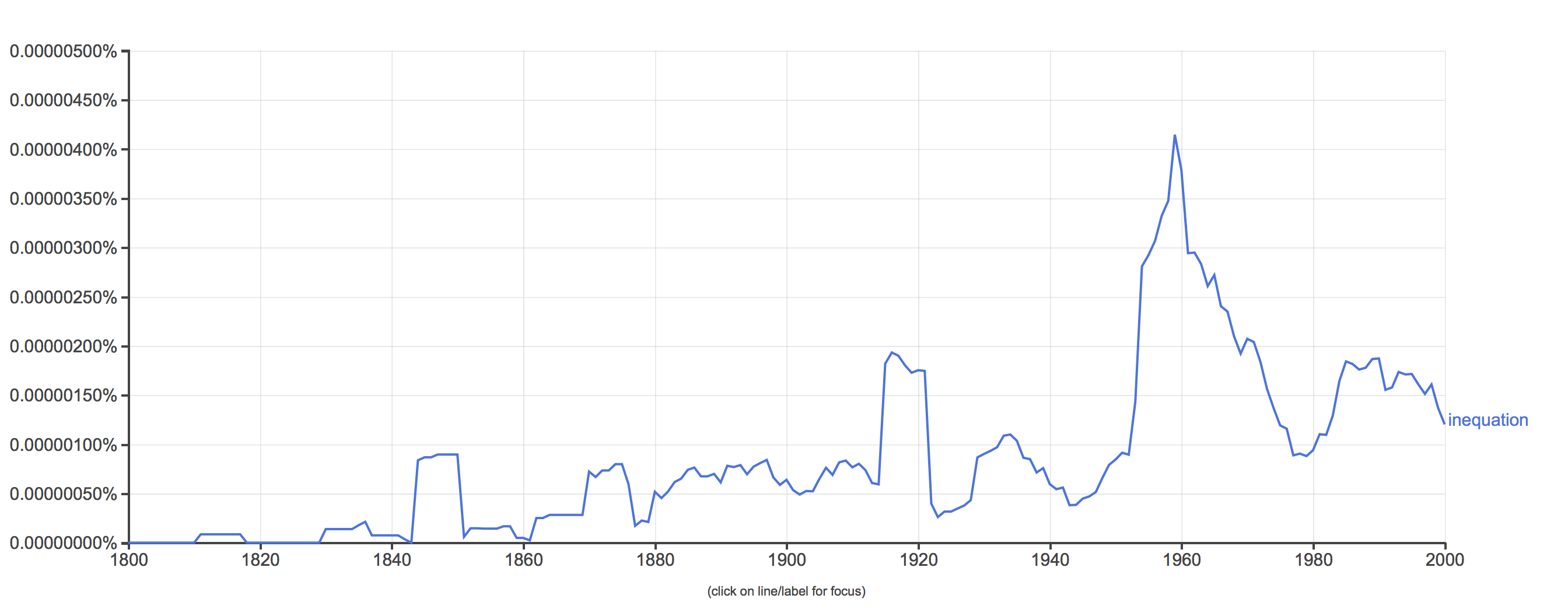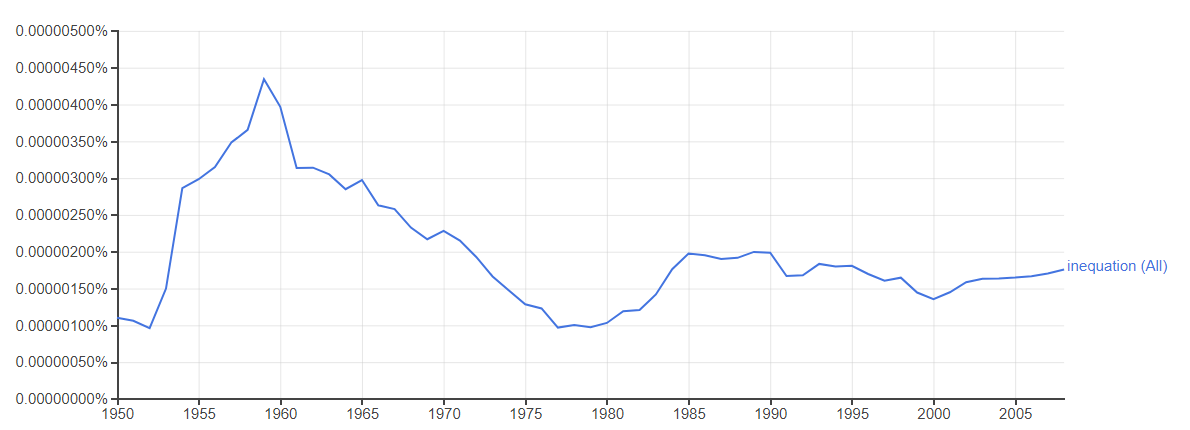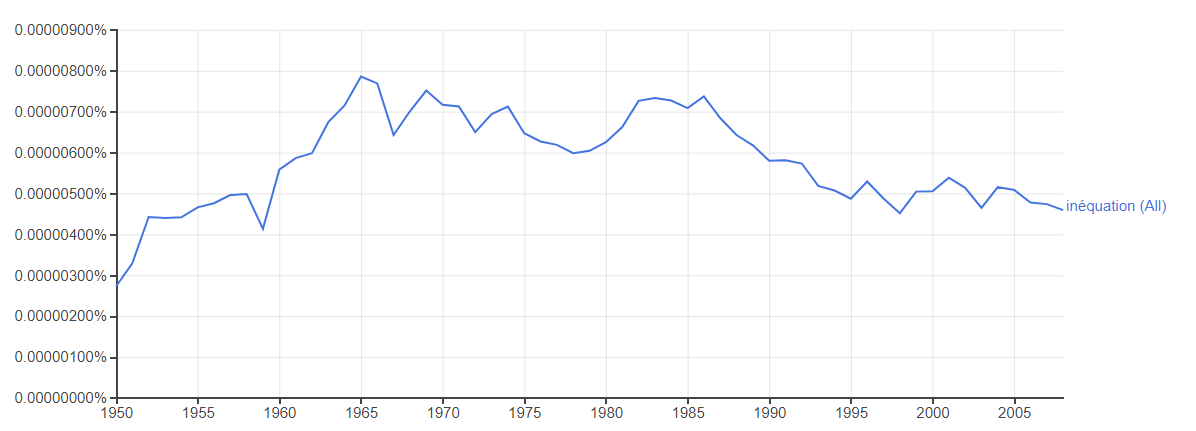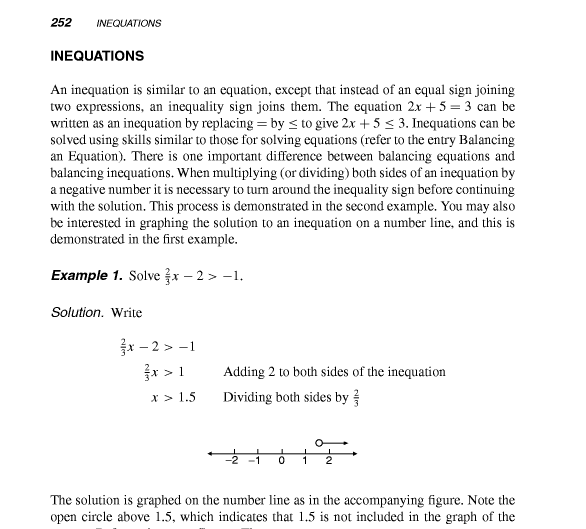You ask "Why isn't the term inequation widely used in English?"
The answer, however tautological, is that the term isn't used in English because it isn't used in English. Perhaps more usefully, remember that languages change and evolve as speakers of the language (for example) start using new words, stop using old words, alter pronunciation, and play with grammatical structure. When a language possesses a word which is used infrequently, the answer to the question of why that word is used infrequently is typically "Because speakers of that language do not frequently require that word in order to communicate ideas to each other."
One important facet of language evolution is that you will almost never find two words which have exactly the same meaning. If a language possesses two synonymous words, one of two things typically happens: either the meanings of the two words diverge (for example, big, large, and huge all mean basically the same thing in English, but have different connotations), or one of the two words will fall out of favor (for example, the word "empathic" in English seems to be in the process of being replaced by "empathetic").
In English usage, the words "inequation" and "inequality" have nearly identical meanings. Moreover, it appears that there are very few instances where a native speaker of English might want to draw a distinction between these two concepts. As such, one of the two words is used quite a lot, while the other is used rarely. We can draw distinctions between the two words (e.g. via the analogy "equality : equation :: inequality : inequation") and assert that the words have quite different meaning, but the fact of the matter is that most English speakers don't feel that distinction, and therefore do not require the word "inequation."
You also, secondarily, ask why the use of "inequation" went into decline in the mid-20th century. I dispute that interpretation of events. If you expand the time scale to cover the last 200 years, you get a very different picture:

First off, if you look at the vertical scale, it indicates that this word has never been all that common, even in the late 50s and early 60s when it hit it's peak. More importantly, it appears to me that the word was hardly used until the late 50s, when usage spiked. The decline after that is simply a return to normalcy.
I think that the more interesting question is "Why did the use of the term inequation appear to spike in the late 50s?" A couple of hypotheses occur off the top of my head:
- The term has never been very common. That spike could easily be the result of the word being used frequently by a very small number of authors. The spike, then might represent the output of one or two people's careers: a lot of publications early on, with fewer publications as they take on other duties.
- The use of the term might be related to the adoption of the "new math" curriculum. It starts trending up a little bit early, but it is possible that the term was brought into vogue by new math advocates, and that the decline coincides with the decline of new math.
- (This is they hypothesis which I favor.) After WWII, tensions between the US and the USSR increased, and a great deal of emphasis was placed on mathematics and engineering education. US institutions recruited a large number of European mathematicians in that time, many of whom were not native English speakers. The spike may be due to their writing in English but with some of their own native vocabulary. The decline could then be explained by acculturation, as well as the deaths and retirements of these European scholars.
Finally, because this website is about mathematics education and not (for example) English language usage, there is a mild pedagogical argument against using the term.
Every time a new term is introduced, you create extra cognitive work for your students. The goal should be to introduce as little jargon and technical terminology as is necessary to understand the underlying concepts. Certainly, there are times when we really need distinct words to describe things. For example, the word continuous is very useful, as it hides a couple of distinct (though equivalent) definitions ($\varepsilon$-$\delta$? left- and right-limits agree with the function? etc.). Still, it is a bit of vocabulary that students have to learn, and they struggle with it. If some bit of jargon does not make future discourse easier, then it should probably be skipped.
In my own teaching, I typically try to avoid using the word "identity," and will typically use it interchangeably with "equality" and "equation" if I do happen to use it. Moreover, I can typically avoid using any jargon by simply asking students to do what I want them to do. For example, instead of asking them to prove an identity, I can simply give them the statement and ask them to prove it. For example, I would write
Show that $\sin(t)^2 + \cos(t)^2 = 1$ for any real number $t$.
instead of
Prove the identity $\sin(t)^2 + \cos(t)^2 = 1$.
I might (depending on the class) finish this by stating "This formula (or equation or identity or statement) is called the 'Pythagorean identity'," but I can do that without ever explicitly defining the word "identity."





